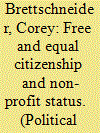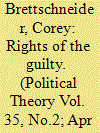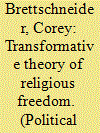| Srl | Item |
| 1 |
ID:
107951


|
|
|
| 2 |
ID:
077229


|
|
|
|
|
| Publication |
2007.
|
| Summary/Abstract |
In this essay I develop and defend a theory of state punishment within a wider conception of political legitimacy. While many moral theories of punishment focus on what is deserved by criminals, I theorize punishment within the specific context of the state's relationship to its citizens. Central to my account is Rawls's "liberal principle of legitimacy," which requires that all state coercion be justifiable to all citizens. I extend this idea to the justification of political coercion to criminals qua citizens. I argue that the liberal principle of legitimacy implicitly requires states to respect the basic political rights of those who are guilty of committing crimes, thus prohibiting capital punishment.
|
|
|
|
|
|
|
|
|
|
|
|
|
|
|
|
| 3 |
ID:
094849


|
|
|
|
|
| Publication |
2010.
|
| Summary/Abstract |
Religious freedom is often thought to protect, not only religious practices, but also the underlying religious beliefs of citizens. But what should be said about religious beliefs that oppose religious freedom itself or that deny the concept of equal citizenship? The author argues here that such beliefs, while protected against coercive sanction, are rightly subject to attempts at transformation by the state in its expressive capacities. Transformation is entailed by a commitment to publicizing the reasons and principles that justify the basic rights of citizens.
|
|
|
|
|
|
|
|
|
|
|
|
|
|
|
|
| 4 |
ID:
100861


|
|
|
|
|
| Publication |
2010.
|
| Summary/Abstract |
Hate groups are often thought to reveal a paradox in liberal thinking. On the one hand, such groups challenge the very foundations of liberal thought, including core values of equality and freedom. On the other hand, these same values underlie the rights such as freedom of expression and association that protect hate groups. Thus a liberal democratic state that extends those protections to such groups in the name of value neutrality and freedom of expression may be thought to be undermining the values on which its legitimacy rests. In this paper, I suggest how this apparent paradox might be resolved. I argue that the state should protect the expression of illiberal beliefs, but that the state (along with its citizens) is also obligated to criticize publicly those beliefs. Distinguishing between two kinds of state action-coercive and expressive-I contend that such criticism should be pursued through the state's expressive capacities in its roles as speaker, educator, and spender. Here I extend the familiar idea that law, to be legitimate, must be widely publicized; I contend that a proper theory of the freedom of expression obligates the legitimate state to publicize the reasons that underlie rights, in particular reasons that appeal to the entitlement of each citizen subject to coercion to be treated as free and equal. My theory of freedom of expression is thus "expressive" in two senses: it protects the entitlement of citizens to express any political viewpoint, and it emphasizes a role for the state in explaining these free-speech protections and persuading its citizens of the value of the entitlements that underlie them.
|
|
|
|
|
|
|
|
|
|
|
|
|
|
|
|